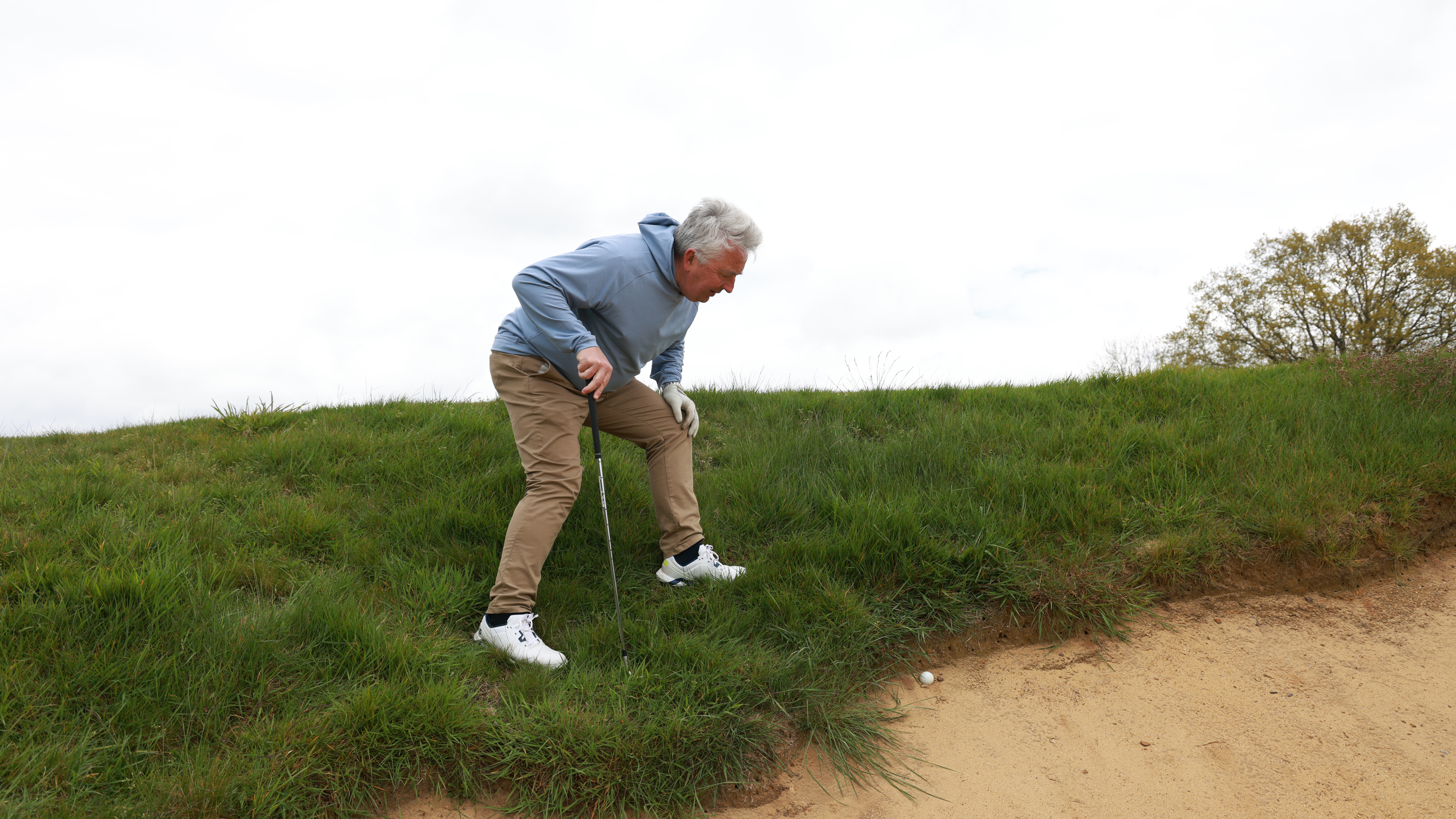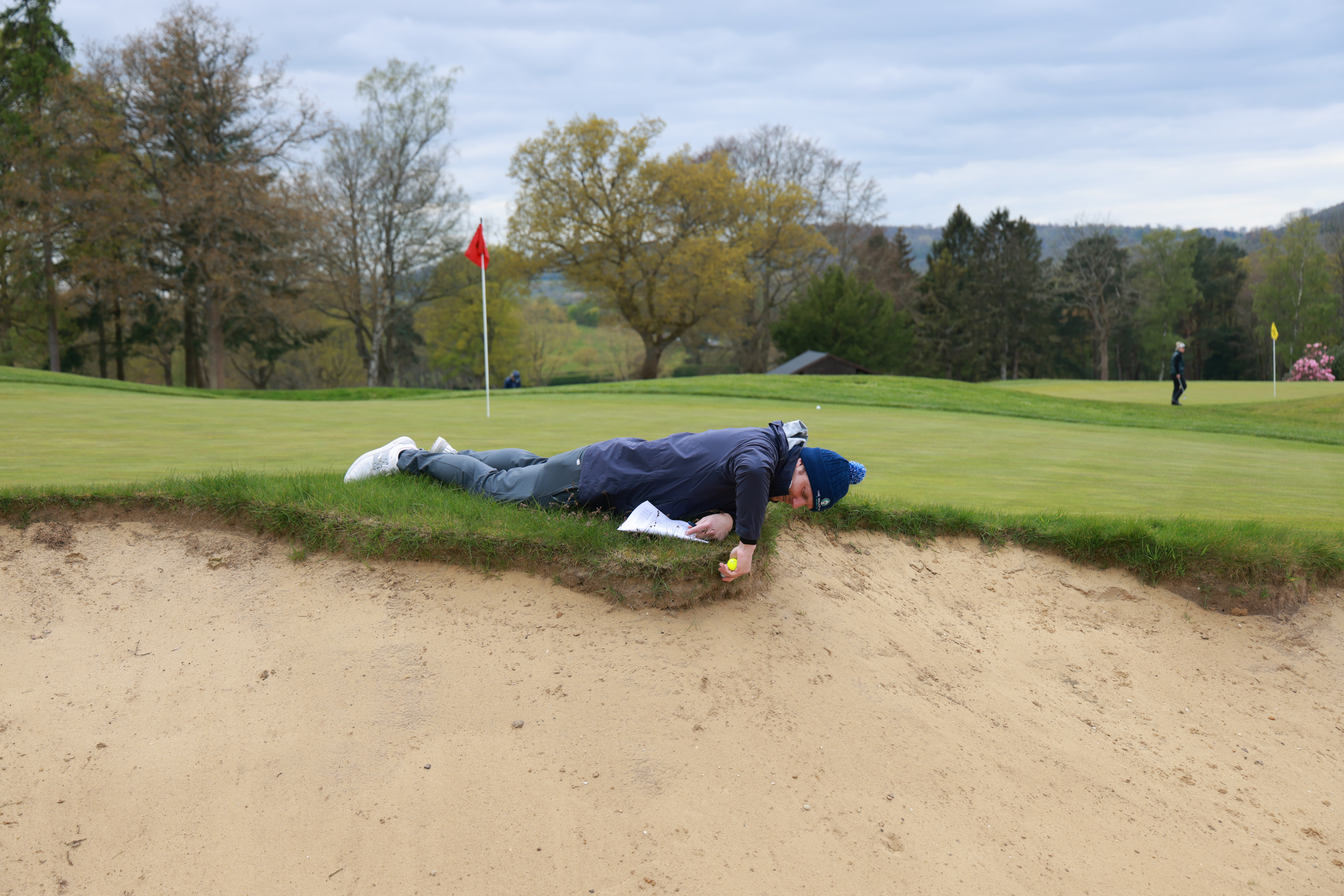When Is A Ball Considered To Be In A Bunker?
Whether or not your ball is deemed to be in a bunker by The Rules of Golf is not quite as clear cut as you might think.

Fergus Bisset

Usually, it’s pretty obvious whether or not a ball is in a bunker, but sometimes uncertainty can creep as was the case for Alejandro Tosti in round three of the PGA Tour’s Myrtle Beach Classic in May when his ball appeared to be embedded in a bunker face. Tosti took to Instagram to voice his displeasure at his ball being ruled in the bunkeras part of it was adjuged to be touching the sand, thus denying him embedded ball relief.
So, where are the boundaries? A bunker is defined as a “specially prepared area of sand, which is often a hollow from which turf or soil was removed”. The definitions section of the Rules then goes on to confirm what is not part of a bunker – i.e., a lip, wall or face at the edge of a prepared area and consisting of soil, grass, stacked turf or artificial materials – and that “soil or any growing or attached natural object inside the edge of a prepared area (such as grass, bushes or trees)” is not part of the bunker.

That one might be lodged in the face....
Rule 12.1 says that a ball is in a bunker when any part of it “touches sand on the ground inside the edge of the bunker”. It also states that your ball is in the bunker when it’s inside the edge where sand would normally be, meaning that even when the sand has been washed or blown away, your ball is still in the bunker even if not physically lying in or on sand.
Conversely, what about sand that has spilled over or is outside the edge of the prepared area as can often be the case on some courses? That is not considered part of a bunker, so any in-or-out decision must be based on where the edge indicates that sand would normally be.
Of course, it’s important to know whether or not your ball is in a bunker because different Rules apply in different areas of the course. For example, if your ball is in the bunker, then under the unplayable ball rule (Rule 19), back-on-the-line and lateral relief for a one-stroke penalty must be within the bunker, with the additional option of dropping back-on-the-line outside the bunker costing a player an extra penalty stroke. And in Tosti’s case, it was pivotal as it dictated whether or not he would get free relief for an embedded ball as there is no such relief in bunkers.
Subscribe to the Golf Monthly newsletter to stay up to date with all the latest tour news, equipment news, reviews, head-to-heads and buyer’s guides from our team of experienced experts.

Jeremy Ellwood has worked in the golf industry since 1993 and for Golf Monthly since 2002 when he started out as equipment editor. He is now a freelance journalist writing mainly for Golf Monthly. He is an expert on the Rules of Golf having qualified through an R&A course to become a golf referee. He is a senior panelist for Golf Monthly's Top 100 UK & Ireland Course Rankings and has played all of the Top 100 plus 91 of the Next 100, making him well-qualified when it comes to assessing and comparing our premier golf courses. He has now played 1,000 golf courses worldwide in 35 countries, from the humblest of nine-holers in the Scottish Highlands to the very grandest of international golf resorts. He reached the 1,000 mark on his 60th birthday in October 2023 on Vale do Lobo's Ocean course. Put him on a links course anywhere and he will be blissfully content.
Jezz can be contacted via Twitter - @JezzEllwoodGolf
Jeremy is currently playing...
Driver: Ping G425 LST 10.5˚ (draw setting), Mitsubishi Tensei AV Orange 55 S shaft
3 wood: Srixon ZX, EvenFlow Riptide 6.0 S 50g shaft
Hybrid: Ping G425 17˚, Mitsubishi Tensei CK Pro Orange 80 S shaft
Irons 3- to 8-iron: Ping i525, True Temper Dynamic Gold 105 R300 shafts
Irons 9-iron and PW: Honma TWorld TW747Vx, Nippon NS Pro regular shaft
Wedges: Ping Glide 4.0 50˚ and 54˚, 12˚ bounce, True Temper Dynamic Gold 105 R300 shafts
Putter: Kramski HPP 325
Ball: Any premium ball I can find in a charity shop or similar (or out on the course!)
- Fergus BissetContributing Editor